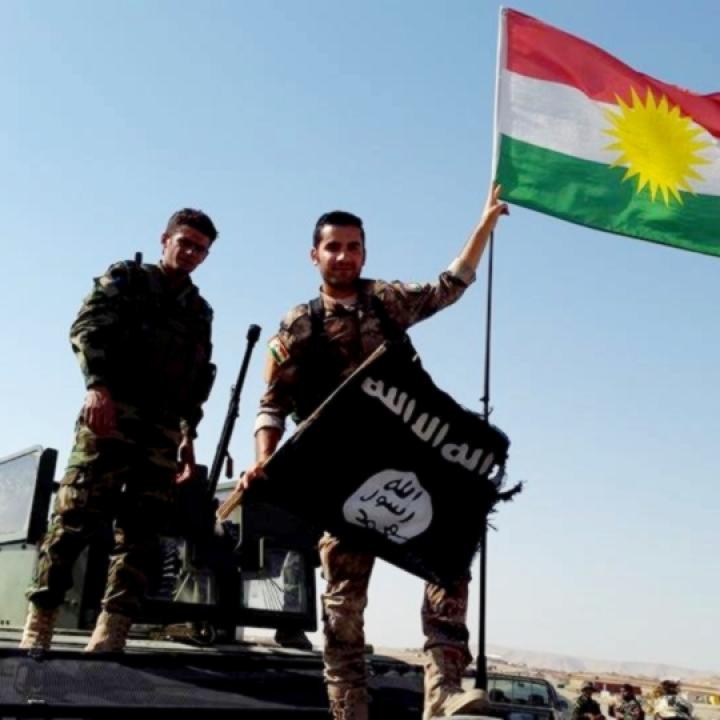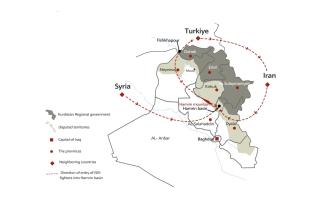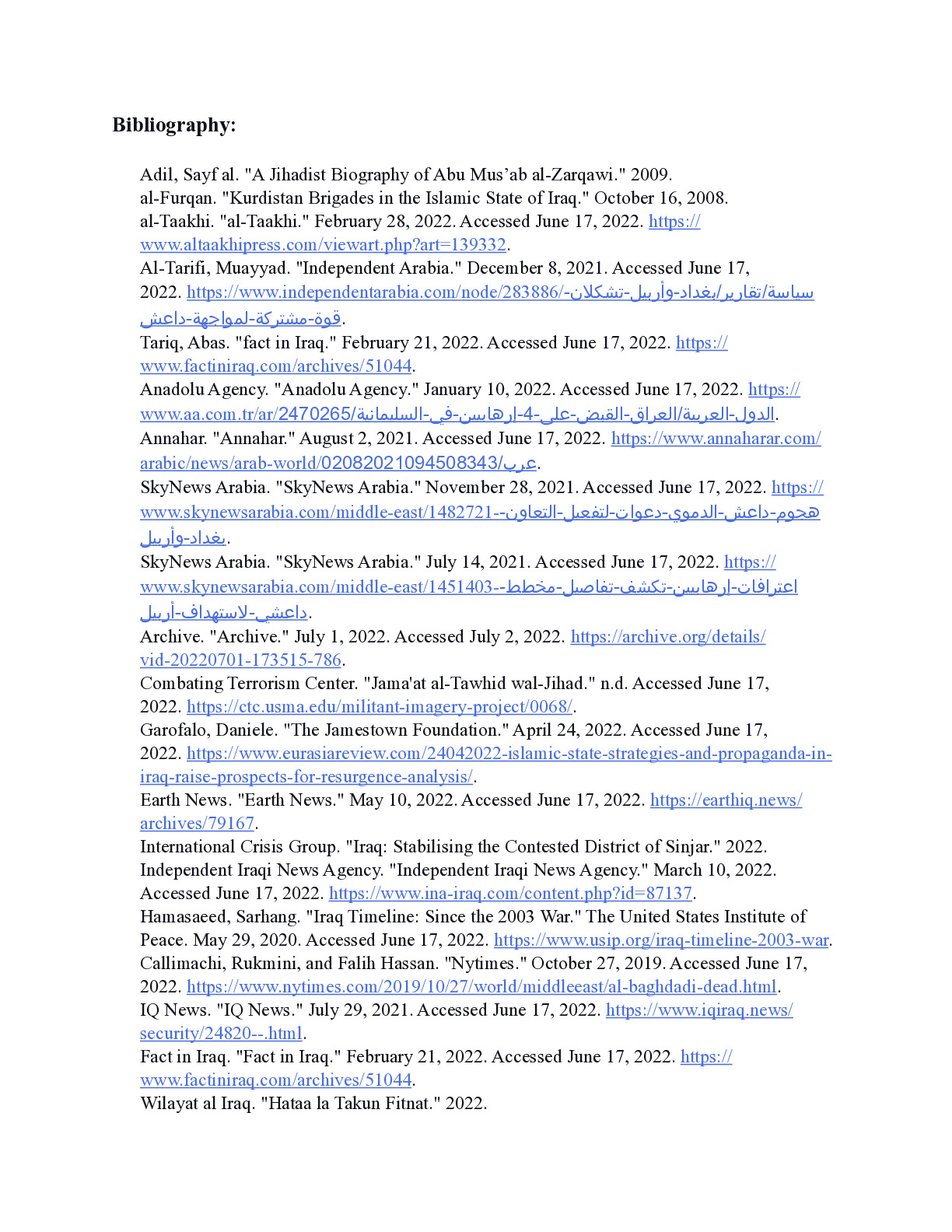
- Policy Analysis
- Fikra Forum
The Kurdistan Region of Iraq's Strategic Role in ISIS Operations—A Crossroads of Conflict

Effective counter-narratives are required to weaken the group's ideological appeal, especially the propaganda targeting Kurdish populations.
Since the death of Abu Bakr al-Baghdadi in 2019, ISIS has undergone significant changes in its strategy and operations, especially in critical Iraqi provinces like Kirkuk, Salahuddin, Diyala, and Nineveh, which have historically been hotspots for insurgent activities and are now playing a pivotal role in the reorganization and operations of ISIS in Iraq.
Iraq’s “disputed territories”–areas claimed by both the federal government and the Kurdistan Regional Government (KRG)–have long been a haven for terrorist organizations. Terrorist leaders Abu Musab al-Zarqawi and Abu Omar al-Baghdadi operated and were eventually killed in hideouts adjacent to disputed areas, and other figures like Abu Bakr al-Baghdadi, Abu Ibrahim al-Quraishi, and Abu Hassan al-Quraishi took advantage of the shaky security situation to conduct operations in this locations. However, extremist groups do not thrive in these contested areas out of convenience alone; the provinces of Kirkuk, Salahuddin, Diyala, and Nineveh all hold significant strategic, economic, and geographic importance.
Due to its vast oil resources, Kirkuk has been an enticing target, while Salahuddin’s proximity to Baghdad gives it immense historical and strategic significance. Diyala’s shared border with Iran makes it valuable as a launch point for cross-border attacks. Nineveh remains a significant symbolic and operational center even after the loss of territorial control by ISIS, as the province is home to Mosul, the once de facto capital of the ISIS caliphate.
The diverse ethnic makeup of each of these provinces has likewise been of interest to ISIS as it has looked to exploit potential cleavages. In addition to military operations, ISIS conducts psychological warfare aimed at destabilizing state authority and creating fear among the population. The ongoing instability in these regions, compounded by political disputes and poor governance, furthers the efficacy of these efforts. However, activity in Erbil and Sulimaniyah is also increasingly visible to Kurdish security and counterterrorism forces.
Historical Evolution of Takfiri Groups in Iraqi Kurdistan
The roots of jihadist takfiri totalitarian movements in Kurdistan can be traced back to the late 1990s when the Islamic Center and the Second Soran Force of the Islamic Movement in Kurdistan (IMK) were established. The IMK played a crucial role in bringing together Kurdish extremists and Arab networks of global jihadists, laying the foundation for takfiri ideology in the region. These early groups formed the basis of connections that later evolved into more organized structures.
Ansar al-Islam, which originated from Jund al-Islam and the Islah Wing (Mullah Krekar’s Gorup), emerged in 2001 as a more militant and organized totalitarian Islamist group with a clear focus on establishing an Islamic Emirate in Kurdistan. This organization quickly gained notoriety for its strict adherence to sharia law and its brutal tactics, which included attacks against both Kurdish and Iraqi government targets after summer of 2003.
During the period following the U.S.-led invasion of Iraq, there was an increase in cooperation between local Kurdish takfiri groups and global terrorist organizations. Key members of Ansar al-Islam, which included Kurdish jihadists, joined forces with Abu Musab al-Zarqawi, a leading figure related to Al-Qaeda and Global Jihad. This partnership resulted in the creation of Tawheed wal Jihad, a group that eventually pledged its allegiance to Al-Qaeda. As a result, Kurdish takfiri elements became part of a broader international terrorist movement. In 2006, Al-Qaeda acknowledged the strategic importance of the Kurdistan region and formally established the Kurdistan Battalions (AQKB). This specialized force recruited not only Iraqi Kurdish and Iranian Sunni jihadists but also played a crucial role in connecting Al-Qaeda in Afghanistan to terrorist operations in Iraq. Internally, AQKB redirected their operations from Kirkuk and Mosul to the Kurdistan Region. Initially, under Abu Omar al-Baghdadi, the Islamic State of Iraq (ISI) focused its efforts against the Kurdistan Region of Iraq (KRI) as well. The rise of ISIS in 2014 witnessed the active involvement of the Kurdish totalitarian Islamists, as evidenced by the formation of the Salahadin Ayyubi Brigade. Kurdish members played a significant role in various operations, including the Sinjar Massacre.
The Evolving Role of the Kurdistan Region in ISIS Operations
Post-Abu Bakr al-Baghdadi, ISIS networks within Kurdistan have been instrumental in maintaining the group’s presence and influence in Iraq and the broader region. Its strategic position has enabled it to act as a corridor for movement from Iran into Iraq and vice versa. Kurdistan has been a home base for a range of ISIS activities, from providing safe havens for ISIS members to serving as a base for launching terrorist acts in other areas of Iraq. It has also played a decisive role in bringing ISIS members together, acting as a calculated link in the broader network of ISIS operations. Its activities extend beyond operational coordination, including direct involvement in terrorist acts within the Kurdistan region itself, a high-risk strategy indicating ISIS's commitment to maintaining its operational capabilities and influence in the region.
After the defeat of ISIS in 2017, many Kurdish members either surrendered or went into hiding. Despite the collapse of the territorial Islamic State, ISIS elements throughout the KRI have displayed remarkable resilience and flexibility in adopting new strategies, such as online propaganda, and exploiting a poor economic situation to draw in recruits. A corresponding escalation is particularly notable in the provinces of Sulaimaniyah, Erbil, and Kirkuk, where Iraqi and Kurdish security forces have coordinated closely to execute a series of operations and arrests aimed at dismantling ISIS networks and thwarting their activities.
The Kurdistan Region Security Agency (Asaysh) announced in 2018 that they had found documents regarding ISIS planned operations and attacks in the KRI, including documents using the idea of a Kurdistan Wilayat with a logo, media, and propaganda network. However, ISIS never announced such a Wilayat publicly. Yet Abu Ibrahim al-Hashimi al-Qarshi—the second caliph and a Turkmen from Tal a’afar in Nineveh (October 2019 - February 2022)—appears to have played a key role in directing ISIS's focus toward the Kurdistan Region. He seems to have closely understood the importance of the KRI as both a potential safe haven for ISIS members and a high-profile target for terrorist acts, and established a separate division in the KRI to highlight its separate identity.
In January 2021, Abu Yasser al-Issawi—the Wali of Iraq and deputy caliph—was killed in a joint operation in southern Kirkuk province. At the time, intelligence sources reported to al-Hurra that Abu Sadiq, whom they identified as the “Wali of Kurdistan,” had also been killed during the strike alongside Abu Yasser al-Issawi. Their joint presence suggests a relationship between them and the significance of Abu Sadiq to the overall ISIS operations in Iraq.
And on February 21, 2022, Lieutenant Yahya Rasul, spokesman of the Iraqi armed forces, reported that the Iraqi troops in coordination with the KRG security forces arrested Mohammed Wahbi Fares al-Shajiri, also known as Abu Ahmed. They identified him as the general coordinator between ISIS cells in the alleged Kurdistan Wilayat and Iraq. The presence of key figures like Abu Ahmed inside the KRI underscores the significant role the region plays in the ISIS hierarchy.
In addition, after U.S. special forces killed Abu Ibrahim in the Idlib region of Syria in February 2022, Abu Hassan al-Qurashi took over as caliph. Despite his short tenure, Abu Hassan likewise sought to activate agents throughout Kurdistan; the Kurdistan Region became a transit route and hiding place via the Turkey-Fishkhapur, Turkey-Iran-Kurdistan, and Turkey-Syria-Anbar routes to the Hamrin basin deep in Iraq’s disputed territories. Moreover, ISIS's recent video in Kurdish, titled "A Strong Letter from the Islamic State to the Kurdish People," emphasizes the ISIS's shift in propaganda tactics—the group is clearly attempting to recruit from the Kurdish population rather than Sunni Arabs.
Tactical and Strategic Adjustments Post-Baghdadi
A host of geopolitical factors have increased the strategic value of Kurdistan for ISIS operations, namely:
- Kurdistan’s Central Location: the Kurdistan Region can function a corridor connecting Afghanistan-Iran to Turkey-Europe and Africa-Syria-Iraq to the Arabian Gulf. Within Iraq, Kurdistan helps connect Mosul to the country’s south.
- Consolidation of Capabilities: the profiles of those arrested over the past years show that ISIS has suicide bombers, security operatives, surveillance teams, Sharia emirs, media experts, logistical, financial and administrative units, document processing teams, smugglers, and detainee support groups in Kurdistan. The fact that most of those arrested are young suggests that ISIS has been able to recruit and educate a new generation—and use them for action when necessary. In this regard, ISIS has been able to rely on the Syria-Nineveh and Syria-Anbar corridors to bring in suicide bombers and use Kirkuk as a base to arm its members against the Kurdistan regional government and Baghdad.
- Support for ISIS Baghdad Operations: ISIS uses Kurdistan to support operations in Iraq, especially Baghdad. The arrests of ISIS operatives planning attacks in Baghdad show that the group’s ambitions are not confined to the KRI. In April 2022, three suicide bombers were arrested in Sulaymaniyah who had come from Syria on the orders of the Wali of Iraq to conduct an operation in Baghdad.
Recent Operations and Arrests in the Kurdistan Region
Over the past three years, the number of arrests of ISIS terrorists in Sulaymaniyah, Erbil, and Kirkuk has increased dramatically. The rise in arrests is partly to increased Baghdad-Erbil coordination—namely in response to two major bloody attacks in late 2021 against the Peshmerga forces in Erbil and Sulaymaniyah. On November 27, 2021, ISIS attacked the 5th Brigade of the Peshmerga Forces in Gulajo, Diyala, killing and wounding nine Peshmergas. And on December 3, 2021, ISIS struck a Kurdish village in Makhmur (60 km southwest of Erbil), killing 13 Peshmergas and civilians. These events made coordination between the Kurdistan Region and Baghdad an inevitable necessity.
Thus, the decision was taken to merge the 20th Peshmerga Brigade of the Kurdistan Regional Government with the 66th Brigade of the Iraqi Army and to form a joint force of 8,000 fighters to protect the disputed areas between the Sulaymaniyah province of Kurdistan Region and Diyala province, which is under control of central government of Baghdad. General John Brennan, the commander of coalition forces in Iraq and Syria, has played a crucial role in improving this coordination and cooperation, solidified by the head of the Iraqi Counter-Terrorism agency’s visit to Sulaymaniyah on January 9, 2022, and the visit of the two Counter-Terrorism agencies of Sulaymaniyah and Erbil to Baghdad on May 9, 2022. This increased intelligence sharing and coordination has aided in hundreds of missions executed by the Iraqi Counter-Terrorism Service. This increase in coordination between security and intelligence agencies in Baghdad and their counterparts in the Kurdistan Region is a positive signal, yet it also reflects the returning power of ISIS in the region.
|
Sample of coordination |
Date |
|
International Coalition announces arrest of two ISIS weapons smugglers in Erbil |
12/16/2021 |
|
Erbil Counter-Terrorism Department announces arrest of a five-person team from Baghdad Wilayat in Erbil for planning a terrorist attack in the region |
12/20/2021 |
|
Kurdistan Regional Security Agency (Asaysh) SWAT in Sulaymaniyah and Piramagrun twon arrest two terrorists, one for breaking into Syria’s Hasakah prison, the other as the cousin of the Wali of Iraq |
1/30/2022 |
|
Erbil Counter-Terrorism Department announces hand-over of ISIS terrorist arrested 11/7/2021 to Baghdad |
2/20/2022 |
|
spokesman for the Commander-in-chief of the Iraqi armed forces announces arrest of Mohammed Wahbi Fares al-Shajiri in Erbil in coordination with the Kurdistan Regional Government security agencies |
2/21/2022 |
|
Erbil Counter-Terrorism Department hands over two ISIS terrorists to the Nineveh Criminal Court, detained October 2021 |
2/28/2022 |
|
Iraqi Counter Terrorism Service announces the detention of six members of the Baghdad Wilayat, one of whom was arrested in coordination with Erbil |
3/1/2022 |
|
Sulaymaniyah Counter-Terrorism Group announces arrest of an Emir involved in the slaughter of two captured Peshmerga members in Sulaymaniyah |
4/13/2022 |
|
Iraqi Defense Ministry announces coordinated arrests of two terrorists in Sulaymaniyah |
5/9/2022 |
|
Iraqi military intelligence arrest a wanted man in Erbil |
5/10/2022 |
|
the Iraqi Counter Terrorism Service announces arrests of six ISIS leaders in coordination with Erbil and Sulaimaniyah,- including Abu Mohammed, (head of ISIS prisoners in the Tigris sector) and Abu Aya, (deputy military leader of Fallujah) |
6/6/2022 |
|
Iraqi Intelligence and Security General Directorate announces arrests of three terrorists in Sulaymaniyah in coordination with the Sulaymaniyah Asaysh |
6/7/2022 |
|
Iraqi Counter Terrorism Service arrests three terrorists in coordination with the Sulaymaniyah Security Directorate |
6/8/2022 |
|
Asaysh announce killing of two ISIS fighters in Sangaw mountain |
11/2022 |
|
Asaysh operation, with arrest of 54 terrorists and death of three |
December 2022-February 2023 |
|
Asaysh, with the assistance of Iraqi security agencies, arrests eight ISIS terrorists who had fled to Sulaymaniya |
3/15-27/2023 |
|
Asaysh announces capture of two terrorists wanted by Iraqi courts |
5/1/2023 |
|
Security Council of the Kurdistan Regional Government apprehends Zidan Khalifa Ahmad Matar, also known as Abu Leila |
9/6/2023 |
|
Asaysh announces arrest of five secret ISIS groups in Sulaymaniyah, Diyala, Salahuddin, and Kirkuk |
11/17/2023 |
Policy Recommendations
In order to ensure stability and combat a resurgent ISIS threat in the region, Kurdish, Iraqi, and international partners need to form a cohesive strategy, including the following steps:
- Enhanced Intelligence Collaboration: It is important that all parties establish more integrated intelligence sharing framework. The KRG, Iraqi government, and the United States leading the Global Coalition Against Daesh should regularly exchange actionable intelligence, participate in joint training programs, and develop a centralized intelligence database.
- Strengthened Joint Military Operations: The coordination of joint military operations between Kurdish Peshmerga forces and the Iraqi Army should be continued and enhanced, particularly in disputed areas. This can be done by deploying joint brigades in key tactical locations to disrupt ISIS operations and prevent the group from gaining ground.
- Addressing Socio-Political Grievances: ISIS has been keen to exploit ethnic tensions, political disenfranchisement, and economic hardships. Efforts should be made to promote inclusive governance and equitable development to reduce the appeal of extremist ideologies especially in disputed area.
- Cross-Border Security Measures: Increased cooperation between neighboring states is necessary to control the movement of ISIS members and resources. This includes tightening border security and improving surveillance capabilities.
- International Support and Collaboration: Continued support from international allies—particularly the United States and coalition forces—is crucial for building the capacity of KRG security forces and enhancing their effectiveness in combating ISIS.
- Counter-Propaganda Initiatives: To combat ISIS's influence, especially in Kurdish-speaking regions, counter-propaganda strategies should be developed and implemented. This can involve community engagement programs, counter-narrative campaigns, and the use of local media to disseminate messages that undermine ISIS's ideology and recruitment efforts. Given ISIS's adept use of online platforms for propaganda and recruitment, enhanced cybersecurity measures and online monitoring are needed to detect and counter ISIS's digital activities.
- Comprehensive De-radicalization Programs: In order to reintegrate former ISIS members and sympathizers back into broader society, services such as psychological support, education, vocational training, and community-based initiatives are needed, which will require extensive investment on the part of the KRG.
Effective counter-narratives are required to weaken the group's ideological appeal, especially the propaganda targeting Kurdish populations. Despite the resilience and progress shown by the ongoing efforts against ISIS in the Kurdistan region, the situation remains volatile and requires constant vigilance. The key to sustained success in countering extremism and instability in the region lies in comprehensive approaches that extend beyond military tactics to address the root causes.





